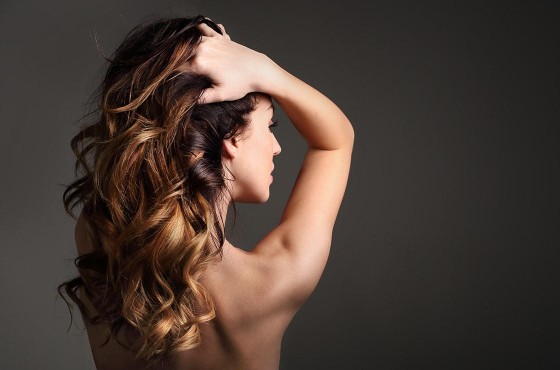Greasy hair:
say goodbye to oily-looking hair
Written by Marion, Aesthetician/Cosmetician | published on | updated on 17/04/2024

There is a widely held belief that poor standards of personal hygiene are to blame for greasy hair. That’s why many people whose hair tends to become greasy quickly wash their hair more often, in the hope that this rid them of this hair condition. Despite this desire for clean hair, those afflicted by greasy hair will unfortunately find that its oily appearance is very difficult to shift. Why does hair have a tendency to become greasy quickly? What can be done to tackle greasy hair?
What causes greasy hair?
What is sebum?
Sebum is secreted by the sebaceous glands located at the root of each hair. The purpose of this oily substance is to keep the epidermis hydrated by forming a protective barrier, the hydrolipidic layer. This film protects the skin from environmental damage and dehydration.
Hyper seborrhoea: the cause of greasy hair
Just as it does for the skin, the hydrolipidic layer of sebum also protects the scalp from becoming dry. However, when excess sebum is produced, it may clog the pilosebaceous follicles, suffocating the hair roots. This prevents the hair from breathing and causes a build-up of oil.
Hyper seborrhoea, or excessive sebum, is therefore the cause of greasy hair.
The causes of hyper seborrhoea of the scalp
There are many causes of hyper seborrhoea of the scalp, including:
- stress;
- pollution;
- poor nutrition;
- testosterone;
- excessive perspiration;
- skin conditions such as seborrhoeic dermatitis;
- harsh, overly frequent shampooing.
What can be done to tackle greasy hair? Effective steps to take
Lifestyle changes
Bad habits to avoid
Certain seemingly inconsequential types of behaviour may in fact encourage the production of excess sebum and cause greasy hair.
- Washing your hair too often can lead to a dry scalp. To alleviate the effects, the sebaceous glands produce more sebum, making the hair even more greasy.
- Rubbing the hair too vigorously: we tend to believe that we should rub the shampoo in as much as possible in order to penetrate right into the hair. In actual fact, this over-handling alters the scalp’s hydrolipidic layer and encourages the production of sebum to replenish it.
- Routinely blow-drying: the hair dryer’s high temperature dries the scalp, which in turn activates the scalp’s sebaceous glands in order to protect it.
- Running your fingers through your hair: done repeatedly, this stimulates sebum secretion.
Review your nutrition
Nutrition on its own does not have a direct role to play in activating the sebaceous glands. There is no straightforward correlation between rich foods and greasy hair. Moreover, even if fat is entirely removed from an individual's diet, it will not necessarily prevent their hair from becoming greasy. However, poor nutrition and a high proportion of fatty foods may encourage greasy hair. If this is the case, you may benefit from rebalancing your diet.
To restore silky hair, remember that foods high in vitamin B, including fish, lean meat, legumes, bananas and eggs, can cleanse the hair follicles.
Use an appropriate shampoo
To prevent scalp irritation, which may further activate the sebaceous glands, greasy hair needs a shampoo with sebum-regulating properties. To help you restore silky soft hair, Cocooncenter has a range of the best shampoos for combating greasy hair.
- BiodermaNodé G Purifying Shampoo 400ml
![Bioderma Nodé G Purifying Shampoo 400ml]()
- KloraneDry Seboregulating Shampoo with Nettle 150ml
![Klorane Dry Seboregulating Shampoo with Nettle 150ml]()
- MKL Green NatureStinging Nettle Charcoal Solid Shampoo Oily Hair 65g
![MKL Green Nature Stinging Nettle Charcoal Solid Shampoo Oily Hair 65g]()
- DucraySabal Seboreducing Treatment Shampoo 200ml
![Ducray Sabal Seboreducing Treatment Shampoo 200ml]()
- GamardeOrganic Peppermint Toning Shampoo Greasy Hair 500ml
![Gamarde Organic Peppermint Toning Shampoo Greasy Hair 500ml]()
- LuxéolOily Hair Shampoo 200ml
![Luxéol Oily Hair Shampoo 200ml]()
- MontbrunOrganic Shampoo with Thermal Water Oily Hair Oil Control 250ml
![Montbrun Organic Shampoo with Thermal Water Oily Hair Oil Control 250ml]()
Dry shampoo: an effective way to tackle greasy hair
Washing hair too often dries the scalp, encourages sebum production and therefore leads to greasy hair. Using a dry shampoo product between washes can be a useful alternative. Dry shampoo is beneficial because it allows you to neutralise sebum without actually having to wash your hair and thereby protects the scalp from becoming dry.
Use a mask to care for your greasy hair
The weekly application of a hair mask designed for greasy hair will help to cleanse your hair and reduce sebum production. Green clay is renowned for its purifying properties. Used as a mask, it has a “blotting” effect, removing impurities and excess sebum.
Use lemon to calm an irritated scalp
Did you know? Lemon has the ability to close the pores of the scalp, helping to prevent irritation and excess sebum production. Harness its benefits by adding the zest of a lemon to a litre of boiling water and leave to steep for twenty minutes. Once cool, simply rinse your hair with the mixture.
Natural remedies for greasy hair: aromatherapy
The great paradox: using vegetable oil to eliminate greasy hair
It may seem paradoxical to use an oil to combat excessively greasy hair, but some vegetable oils are in fact capable of regulating sebum production. These include:
- jojoba;
- hazelnut and
- passion fruit.
Use the oils as follows:
- Apply the oil throughout the hair;
- Cover the hair with a towel and leave to work for half an hour;
- Wash the hair using a mild shampoo.
The power of essential oils to regulate sebum
Essential oils are also very beneficial when treating greasy hair. They are 100% natural and have anti-fungal and anti-bacterial properties.
Essential oils with particularly effective sebum regulating action include:
- atlas cedar essential oil;
- grapefruit essential oil;
- tea-tree essential oil;
- rosemary essential oil and
- sage essential oil.
Try the following combination specifically for greasy hair:
To a 100 ml bottle add:
- 60 drops of grapefruit essential oil;
- 4 tablespoons of jojoba oil and
- 4 tablespoons of hazelnut oil
Mix well before using as a mask.
Often, greasy hair seems to need frequent washing to restore its silky softness. In reality, the key factor is actually the quality and not the quantity of the products used.
Greasy hair: three key takeaways:
- Greasy hair is the result of excess sebum on the scalp.
- Avoid shampooing greasy hair too often, as this will simply exacerbate the problem.
- Thanks to clay’s ability to regulate sebum, clay masks are a formidable weapon in the battle against greasy hair.


























